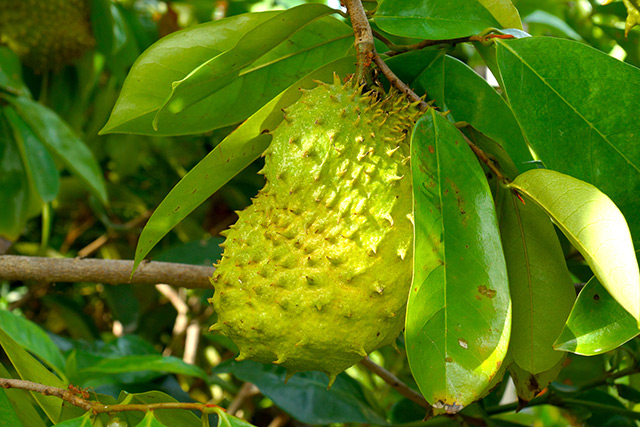Soursop leaves may alleviate symptoms of fibromyalgia
03/06/2019 / By Michelle Simmons

People with fibromyalgia suffer from pain all over the body, which affects their quality of life. Since it is a lifelong condition, scientists continue to find ways on how to manage the condition or reduce its symptoms. A team of researchers from the University of Seville in Spain reports that diets supplemented with aqueous extract of soursop (Annona muricata L.) leaves can prevent the symptoms of fibromyalgia. This, in turn, improves the quality of lives of people with fibromyalgia.
In the U.S., fibromyalgia affects nearly four million adults. People with this condition are sensitive to pain. In addition to pain, people with fibromyalgia may experience fatigue and tiredness, depression and anxiety, sleeping difficulties, difficult thinking, recalling memory, and concentrating, and headaches — all of which are the most common symptoms of the condition.
For the study, the research team aimed to determine the effect of consuming soursop leaf extracts on mice with fibromyalgia. To do this, they got 60 five-week-old female rats and divided them into six groups. They fed the rats with a standard diet combined with different doses of an aqueous extract soursop leaf extract supplement for a period of four weeks.
Soursop plant is native to the tropical regions of the Americas and is particularly abundant in the Amazon region. Its leaves are oblong in shape and are between 5- and 15-centimeters (cm) in length. The plant and leaves are typically used for medicinal uses. In traditional medicine, they are used to treat inflammation, pain, infections, diabetes, and cancer. These medicinal uses have been validated through pre-clinical trials. (Related: Soursop Leaves Tea- Fight Cancer, Treat Type 2 Diabetes, Great Diuretic And More.)
Published in the journal PharmaNutrition, the results of the study showed that the supplementation with soursop leaf extracts can reduce chronic pain, anxiety, and depression brought about by fibromyalgia.
With these findings, the research team aims to conduct clinical tests with humans to confirms the extract’s activity and set a safe and effective dose in humans.
Soursop leaf extracts help fight against breast cancer
Soursop leaf extracts have been found to be effective against cancer. In 2018, researchers from Seoul National University (SNU) in South Korea reported that extracts from soursop leaf have anti-cancer effects.
For their study published in the journal Evidence-Based Complementary and Alternative Medicine, they looked at the anticancer properties of soursop leaf extracts on breast cancer cells. The Korean researchers used a methanol-processed solution to identify and count the phytochemicals in the extract.
For the experiment, the researchers cultivated two different cell lines: MCF-7 line and MDA-MB-231 line. The researchers used the MCF-7 cell line for the control group. This line is composed of breast cancer cells that were tested positive for estrogen receptor biomarkers. On the other hand, the latter line is a triple negative breast cancer cells’ strain, which served as the treatment group. They applied soursop leaf extract on both cancer cell cultures and carried out various tests to determine the individual properties of the extract.
Based on the results of the study, the researchers found that soursop leaf extract was toxic against both breast cancer cell cultures. The extract decreased the viability of the cells and suppressed the growth of the cancer cells. Soursop leaf extract also prevented the motility of the breast cancer cells, limiting their ability to harm healthy cells. In addition, the extract hampered the healing of the wounded carcinoma. Additionally, they found that as they increased the dose of the extract, its toxicity against the cancer cells also increased, as well as its effects on the cell motility.
The results also revealed that soursop leaf extract used various ways to cause cell death in both cultures. For the MCF-7 cell line, it utilized the estrogen receptors to trigger and enhance the self-destruct sequence. For the MDA-MB-231 line, it attacked the mitochondria and damaged the DNA of cancer cells to trigger cell death.
Sources include:
Tagged Under: alternative medicine, Annona muricata, fibromyalgia, graviola, herbal medicine, Herbs, medicinal plants, natural cures, natural healing, natural medicine, natural remedies, pain, pain relief, soursop, soursop leaf extract, soursop leaves
















